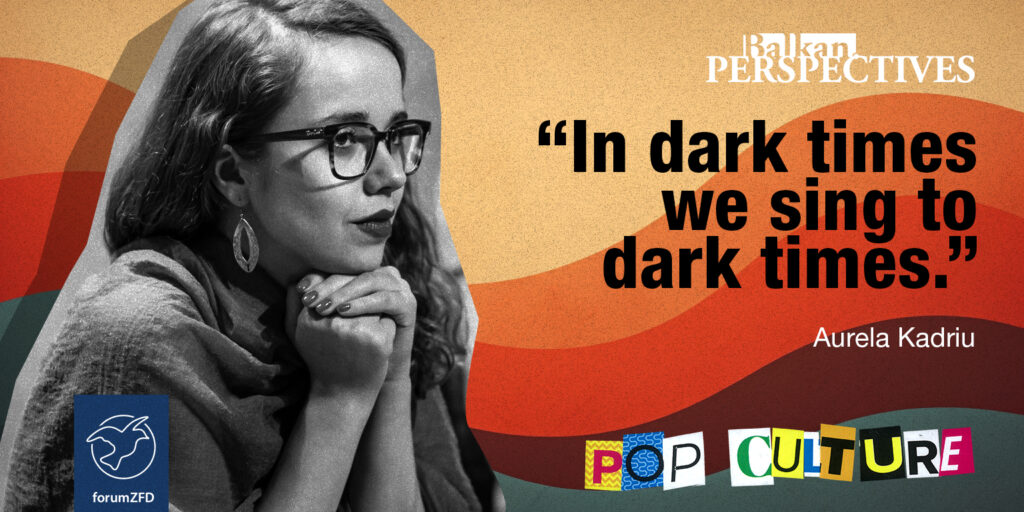L A B I A
It is 1991. I am not born yet. My parents are not married yet. Kosovo is going through a major historical and social breakage. Kosovo Albanians are excluded from public life. Health, education, and culture have been shifted into private spaces. Now, Kosovo Albanians must rethink even their rendezvous spots, their meeting points for joy and celebration, grief, and death wakes. The deeply human experiences of exchanges often taken for granted now must be weighed and chewed on at length. The foundations of a society that will need time to appreciate public space again are being laid. Autonomy has been suppressed. Segregation is clear. My parents were alive and conscious through some of these major social breakages. This time there will be war.
From this point of view, it is difficult for me to believe that an ordinary person prepares for war. An ordinary person never believes a war will happen – even when bombs fall from the sky (according to Slavenka Drakulić). “Dear is the soul” –– is a phrase I often heard growing up. At such historical moments, where the social exclusion of a group occurs so openly by an external enemy, the people who are excluded and oppressed try to find tiny spaces of freedom in-between. Life continues to happen, even amidst terror and fear. People fall in love, they rejoice, people are born and die even amidst terror and fear. The battle for survival is not linear – it takes the shape of both lament and joy, of dance and even exchanging music albums. Because on days like that, every day, everyone survives, even the ones who are unaware of the extent into which the political situation has potential to escalate. People find a way. Each in their own way.

In 1991, Shkumbin Kryeziu was a student at the Law Faculty, and a young performer of entertainment music. With the exclusion of Albanians from public life everything had to be re-thought. Once a celebrated and awarded singer, now he and his family had to find their own way of survival. “Labia” was the shape of the survival of Shkumbin and his family. “Labia,” which became iconic in the lives of people in Kosovo in the ‘90s and in the lives of those who grew up right after the war of ‘99 in Kosovo.
Iconic in the sense that music, film, and festive editions produced and distributed by “Labia” were the few “normal” exchanges in those abnormal times and as such, established a reference point that cannot be exceeded nowadays as we attempt to create a picture of the TV production and entertainment industry in the country. “Labia” is a production company established in Kosovo in 1991, throughout the dark years in the ‘90s “Labia” produced and distributed music of a variety of genres, films, and New Year’s festive editions, with music and skits. “Labia” had three shops in Prishtina, and a distribution network in Kosovo and abroad.
ERROR – TAPE GLITCH
There is something, like a “tape glitch,” that bothers me as I watch in retrospect the videos produced by “Labia” in the ‘90s. It seems as if those memories are not mine, like a story I do not belong to. But I was part of it. And I know that many young people of this country were part of it. “Hajde me Shuplakë” by La Fazan is a production based entirely on the materials that we would see back then through “Labia” productions. “Hajde me shuplakë” is not something new to me, it triggers something in my memory that I am familiar with. That is why I cannot regard it as anything other than the need of a youth band to own that part of their story. To place themselves in that story where we feel we do not belong.
I experienced the joy of exchanging the video cassettes we inherited from before the war and had become part family collections in the pre-war years. The battles we, as children, would fight with the adults not to listen to songs but to watch the skits are vivid. And I remember very well the joy when one of my cousins had the second, first or third part of some edition. “I have number 1, do you have number 2” was not just an exchange but an entire experience of the agreeing to lend the cassette, to go and pick the “missing part” from each other’s houses and coming back home excited, gathering in front of the TV set to watch the missing part. With the challenging economic and social situation right after the war, I guess it would be too much to expect an average family of that time to be ready ready to spend on entertainment the money needed to buy the three parts of the video cassettes of that time.
Something from the magic of my childhood is washed away when Shkumbin tells me nowadays that the division of festive editions of “Labia” into three cassettes was a pragmatic and economic decision because instead of selling one video cassette at the market price, three such would be sold and the cassette production, which at that time was a rarity and had to be done at factories in Serbia and Croatia was easier when the film was shorter. Nonetheless, I am remarkably familiar with the feeling of disenchantment.
I grew up in a country where history is learned through extremes and everything in between, the spaces where in fact human sensitivity and experience reside, must go through filters of validation to surface.
I do not mean to say that it is tragic not to talk about or acknowledge the contribution of a production company which, nonetheless had an essentially business nature but it is tragic that we did not manage to create a friendly environment to recognize and embrace human experiences which are there, happened to a lot of people outside of the validated historical boxes. And above all we need to use them as indicators of exactly this – the deeply human experience and sensitivity – which is poorly documented here.
“Labia” produced something of everything at a time when people’s chances to be exposed to culturally and artistically identifying figures were limited, and at a time when a development of choices was truncated, because exchange and exposure opportunities, that had already been meagre, were entirely denied. However, life went on for people, they continued to have preferences for folk, pop, rap, rock n’ roll music, to throw parties and gatherings, to watch movies that communicated with their experiences and above all, people went on the have the need to laugh, maybe more than ever. And people did laugh! They laughed so much and continue to laugh even nowadays with the festive editions produced by “Labia” in the ‘90s. We often say around our tables some word that was said in “Labia”’s skits. We often sing a song of those times which nonetheless is not far away. In fact, to access the memories of that time, the experiences of that time, scrutinizing “Labia” is unavoidable.
FAST FORWARD – 2023
It is 2023. I am sitting in front of my computer made in 2020, and by today’s standards of technological consumption and production, this is an “outdated” product. I progressed really fast from exchanging video cassettes to DVDs and CDs all the way through to artificial intelligence. I lived for a shorter while in the period of excitement about exchanging video cassettes and for a longer while in the period when you don’t have to climb mountains to access information.
Nowadays, Kosovo has no printed newspaper. Therefore, I believe I am well understood when I thought it almost impossible when Shkumbin told me that the biggest marketing for “Labia”’s productions in the ’90s happened in the small marketing spaces of the printed newspapers of the time, which were not inexpensive! I grew up so fast through all these technological advances that it feels like I cannot absorb everything all at once.
Now, in my constant efforts to ‘repair the tape glitch’ sitting in front of my computer I am attentively listening to the songs of Armend Rexhepagiq, Adelina Ismaili, Violeta Rexhepagiq and many other who have become part of our current daily life. “Betohem në këngë” (1998) of Armend Rexhepagiq makes me to totally humanly want to be in the place of someone, who in 1998, when freedom is such a fervent dream, is sang “I need you like freedom” to.
Maybe society back then was not ready to face lyrics like the ones in “Mos ma ndal” by Adelina Ismaili or the entire album “Viviene” by Violeta Rexhepagiq. But this is how societies are brewed, sometimes at the speed of light, because sometimes life happens in the most inappropriate places, as James Baldwin would put it.
Nowadays, these songs speak differently for those times and for the present. Nowadays we celebrate these songs not only as evidence of the past but also as something that “glues the tape” especially for our generations who belong neither to that nor to this time. So, it helps us fill the gaps created by a polarization of history that has left under the radar the “smaller” stories and made us often to feel as if our stories from the “gray area” are not worthy of being owned because we felt as if they had to compete with the extreme poles of the history of heroes and traitors, which not necessarily all of us belong to.
I came to know the production “Labia” through the festive editions for New Year, which are an inseparable part of family memories and I re-discovered it later, when the persons and songs I had come to know through “Labia” became icons of the resistance of our times, like Adelina Ismaili, whose songs I hear in almost every pride parade in nowadays Kosovo. And, “Labia” may have laid certain aesthetic foundations, which we could discuss and re-evaluate, but we cannot ignore the documentation and inclusive character of the work that was done during that time of great darkness.
At the end of our conversation, Shkumbin tells me that the war was fought on two fronts: in keeping the soul alive, and through the resistance of armed forces. Thankfully, people survived even by singing. And thankfully there were songs and skits. “In the dark times / will there also be singing? / Yes, there will also be singing. / About the dark times,” Bertolt Brecht used to say.
Do we need today production and entertainment industry whose mission is to keep the soul rather than enrich it? Do we need to validate the consumption of artistic production upon the criteria of whether it makes us laugh or not? These are open questions for discussion and thought. I say yes, let’s consume art to feel good and laugh, but let’s make sure to also recognize the big truth amongst us that social processes that today’s societies are facing, seek an artistic production that cuts the vicious cycles of comfort zones, confront and encourage reaction, organization and awareness for more accepting, inclusive and open societies.
*This article was originally written in Albanian
Aurela Kadriu is a sociologist, researcher and cultural manager. Her studies are focused on memory and contemporary history of Kosovo and former-Yugoslav countries. Her studies related to culture, memory, public space, gender and socio-urbanism have been published in digital archives as well as in the form of books, articles, films and exhibitions. She currently works at Qendra Multimedia – an independent cultural organization focusing on contemporary theater and literature.




